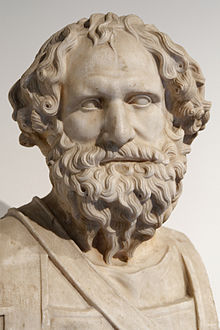Archidamus III
This article needs additional citations for verification. (December 2009) |

Archidamus III (Ancient Greek: Ἀρχίδαμος Γ΄), the son of Agesilaus II, was king of Sparta from 360 BC to 338 BC.
While still a prince, he was the eispnelas (εἰσπνήλας, inspirer, or pederastic lover) of Cleonymus, son of Sphodrias. He interceded with his own father to spare his aites' (ἀΐτας, lover) father's life in a legal matter, an action which further intensified friction between Athens and Sparta.[1] He later led the Spartan forces both before and during his rule. Archidamus headed the force sent to aid the Spartan army after its defeat by the Thebans at the Battle of Leuctra in 371 BC and was commander later during the fighting in the Peloponnese. He scored a victory over the Arcadians in 367 BC but was in turn defeated by them in 364 BC at Cromnus. In 362 BC he showed great courage in the defense of Sparta against the Theban commander Epaminondas. As king, Archidamus supported the Phocians against Thebes in the Sacred War of 355–346. In 346 BC he went to Crete to help Lyttos in their struggle against Knossos in the Foreign War. In 343 BC, the Spartan colony Tarentum asked for Sparta's help in the war against the Italic populations, notably the Lucanians. In 342 BC Archidamus arrived in Italy with a fleet and an army and fought against the barbarians, but in 338 BC he was defeated and killed under the walls of Manduria. He was succeeded by his son Agis III, and was also the father of Eudamidas I and another son named Agesilaus.
References
- ^ Percy, William Armstrong (1998). Pederasty and Pedagogy in Archaic Greece. University of Illinois Press. p. 88. ISBN 0-252-06740-1.

